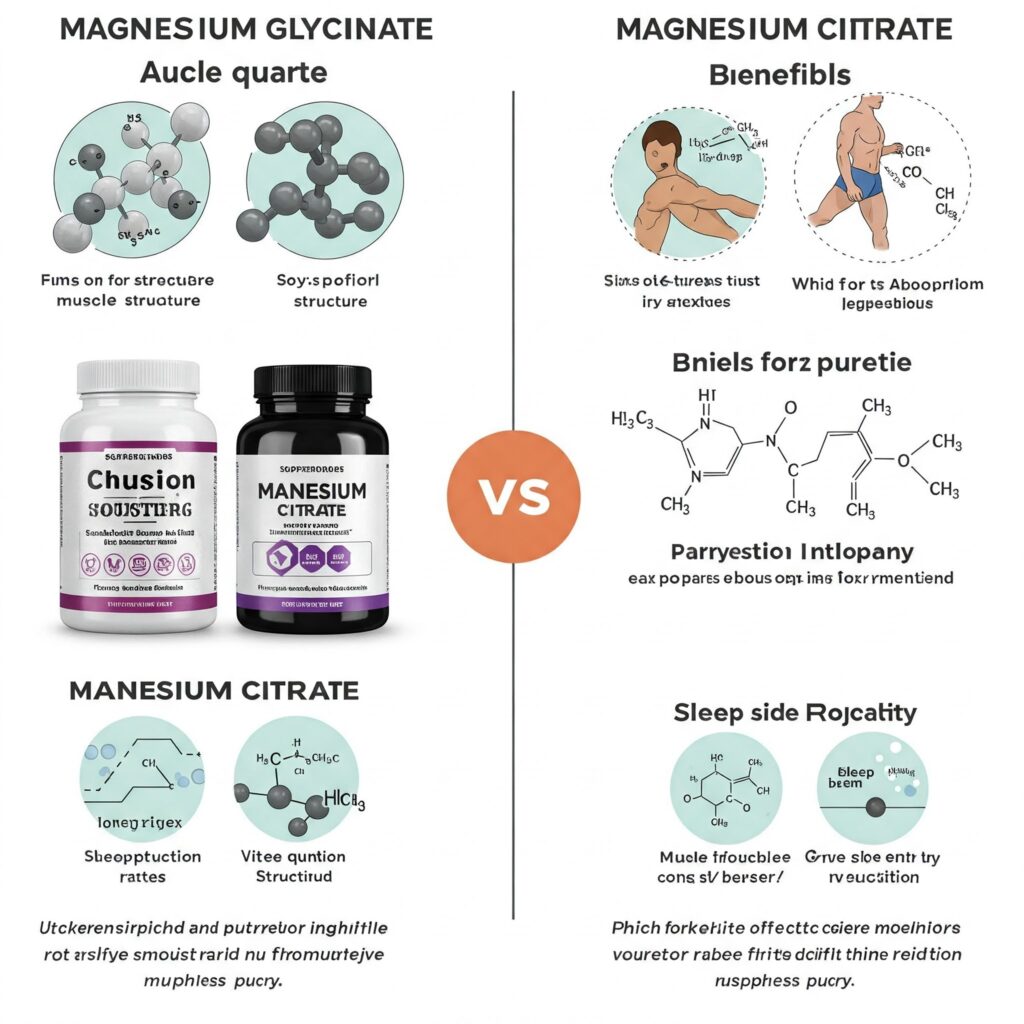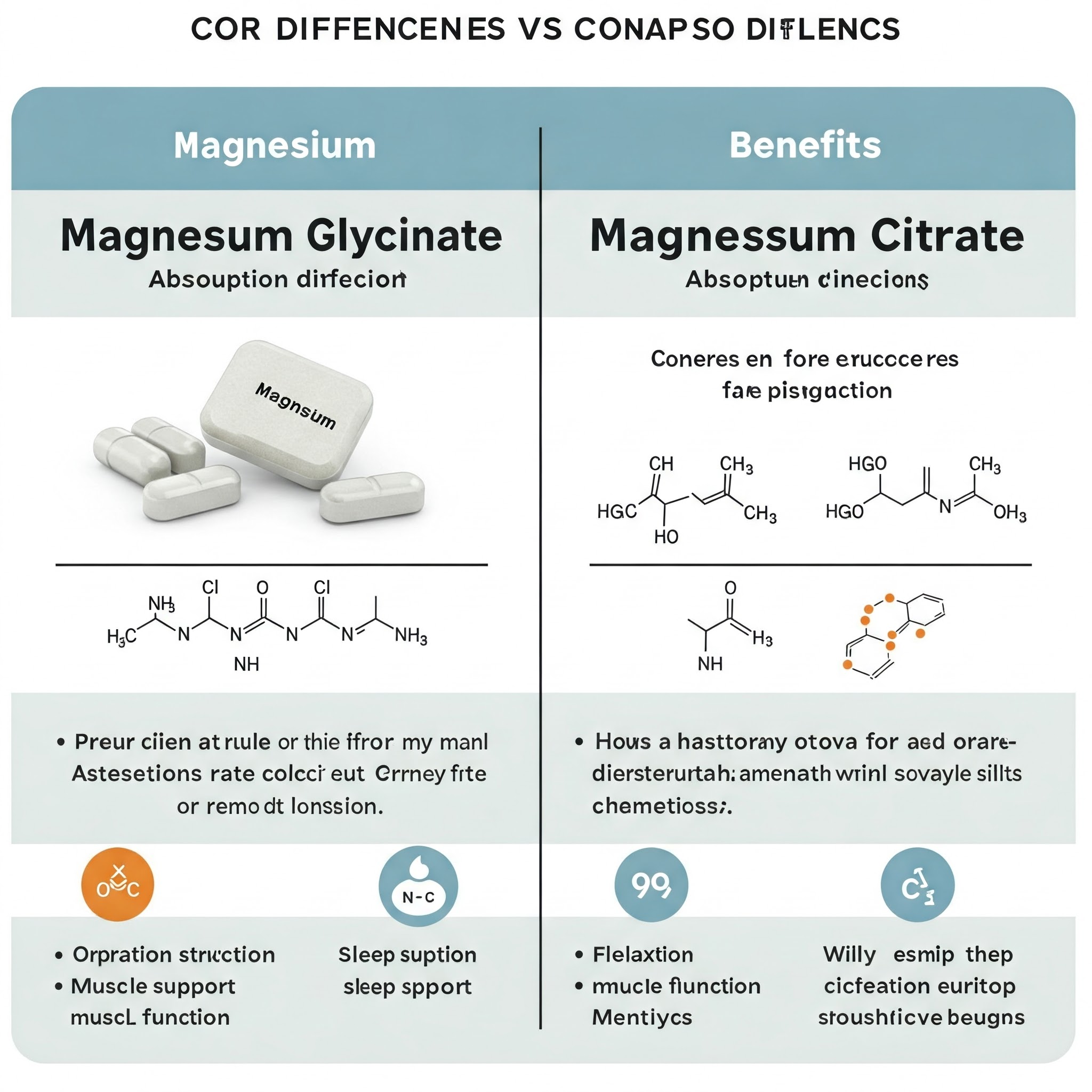Introduction
When it comes to choosing the best magnesium supplement, the debate between magnesium glycinate vs citrate is one of the most common. Both forms are widely used, each with its own unique advantages. In the world of health and wellness, understanding the difference between magnesium glycinate vs citrate is essential for making informed decisions about supplementation. Whether you’re looking to improve sleep, support digestion, or reduce muscle cramps, knowing the pros and cons of magnesium glycinate vs citrate can lead you to better health outcomes.
More people are turning to magnesium supplements than ever before, and the comparison of magnesium glycinate vs citrate is a hot topic. Both are bioavailable, effective, and well-researched—but the benefits differ. In this article, we’ll dive deep into the science, usage, and effects of magnesium glycinate vs citrate, so you can confidently select the right one for your needs.
Understanding Magnesium and Its Health Benefits
Before comparing magnesium glycinate vs citrate, it’s important to understand why magnesium matters. Magnesium is a vital mineral involved in over 300 enzymatic processes in the human body. From muscle function to energy production, magnesium is indispensable for overall wellness. When looking at magnesium glycinate vs citrate, both forms help increase your body’s magnesium levels—but in different ways.
A deficiency in magnesium can lead to fatigue, mood swings, muscle cramps, and even high blood pressure. That’s why the conversation around magnesium glycinate vs citrate is not just a supplement debate—it’s a wellness priority. While many foods contain magnesium, dietary shortfalls make supplements necessary for many people.
The choice between magnesium glycinate vs citrate depends on your body’s needs. Whether you want something gentle or something to help with digestion, learning the unique attributes of magnesium glycinate vs citrate is the first step toward better health.
Magnesium Glycinate: Composition, Benefits, and Usage
In the magnesium glycinate vs citrate comparison, glycinate stands out for its calming effects. Magnesium glycinate is a compound made of magnesium and glycine—an amino acid known for promoting relaxation. This chelated form is highly bioavailable and very gentle on the stomach, making it a popular choice in the magnesium glycinate vs citrate debate for individuals with sensitive digestion or anxiety.
People turn to magnesium glycinate vs citrate discussions when they want to understand which supplement is best for stress and sleep. Magnesium glycinate supports better rest, reduces muscle tension, and enhances emotional stability. Its non-laxative effect is a big win in the magnesium glycinate vs citrate conversation.
What makes magnesium glycinate vs citrate particularly interesting is how glycinate works without causing diarrhea—a common concern with some magnesium supplements. For those looking to take magnesium regularly without digestive discomfort, glycinate is often the better half of the magnesium glycinate vs citrate equation.
In the end, if you’re seeking mood support and deeper sleep, magnesium glycinate vs citrate often tilts in favor of glycinate. It’s excellent for long-term use, and its effects can be felt within just a few days of consistent intake.
Magnesium Citrate Composition, Benefits, and Usage
Now let’s look at the citrate side of the magnesium glycinate vs citrate coin. Magnesium citrate combines magnesium with citric acid, which enhances solubility and absorption. When comparing magnesium glycinate vs citrate, citrate is frequently chosen for its laxative properties and its ability to relieve constipation.
When it comes to magnesium glycinate vs citrate, citrate is often used in medical settings to cleanse the bowel before surgery. However, it also has general wellness benefits. In the ongoing magnesium glycinate vs citrate debate, people choose citrate for quicker digestive relief.
While both forms are absorbed efficiently, the impact of magnesium glycinate vs citrate varies. Citrate’s fast-acting nature makes it ideal for short-term use or specific digestive concerns. However, in terms of long-term daily use, the magnesium glycinate vs citrate analysis often points out that citrate may cause loose stools in sensitive individuals.
If your main concern is occasional constipation, the magnesium glycinate vs citrate decision likely leans toward citrate. It’s widely available, affordable, and effective—making it a solid part of the magnesium glycinate vs citrate supplement spectrum.
Head-to-Head Comparison: Magnesium Glycinate vs Citrate

The heart of this article is the head-to-head battle of magnesium glycinate vs citrate. Both have high absorption, but the outcomes they deliver vary greatly. When examining magnesium glycinate vs citrate from a bioavailability standpoint, glycinate wins for its calming, non-irritating effects. However, when digestive support is needed, citrate shines.
One of the biggest reasons people compare magnesium glycinate vs citrate is to determine which is more effective for their personal goals. Glycinate is better for anxiety, insomnia, and muscle cramps. Citrate is better for constipation and quick bowel relief. This makes magnesium glycinate vs citrate a matter of health-specific priorities.
In terms of side effects, magnesium glycinate vs citrate shows clear differences. Citrate may cause diarrhea, especially at high doses, while glycinate is generally well-tolerated. This makes the magnesium glycinate vs citrate decision important for individuals with digestive sensitivities.
Price and availability also play a role in the magnesium glycinate vs citrate comparison. Citrate is cheaper and more accessible, but glycinate is worth the extra cost for those who need stress or sleep support. Ultimately, the choice between magnesium glycinate vs citrate should align with your body’s needs and your wellness goals.
Conclusion
The discussion of magnesium glycinate vs citrate is more than just a comparison—it’s a guide to understanding how magnesium can support different aspects of your health. If your goal is relaxation, sleep, and a supplement that’s gentle on the stomach, magnesium glycinate is the better pick in the magnesium glycinate vs citrate debate. On the other hand, if you’re looking to relieve constipation or need a fast-acting supplement, magnesium citrate is the way to go.
When evaluating magnesium glycinate vs citrate, it’s not about which is universally better—it’s about which is better for you. Your body, lifestyle, and health needs determine the best option in the magnesium glycinate vs citrate discussion. Whether you go with one or use both at different times, understanding magnesium glycinate vs citrate gives you the power to take charge of your health with confidence.
FAQs About Magnesium Glycinate vs Citrate
What is the difference between magnesium glycinate vs citrate?
Glycinate is calming and great for sleep, while citrate supports digestion and relieves constipation.
Is magnesium glycinate vs citrate better for sleep?
Magnesium glycinate is preferred for sleep due to its glycine component.
Can I take magnesium glycinate vs citrate together?
Yes, they can be combined depending on your goals—but consult a healthcare provider.
Which is better tolerated: magnesium glycinate vs citrate?
Glycinate is gentler and causes fewer digestive issues than citrate.
How often should I take magnesium glycinate vs citrate?
It depends on the form and your needs—glycinate is good daily; citrate may be used as needed.
Is magnesium glycinate vs citrate better for muscle cramps?
Magnesium glycinate is more effective for muscle support and recovery.
Can I switch between magnesium glycinate vs citrate?
Yes, switching based on your current needs is common and effective.
Is magnesium glycinate vs citrate more expensive?
Glycinate is typically more expensive but offers specialized benefits for stress and sleep.
Do both magnesium glycinate vs citrate absorb well?
Yes, both are well-absorbed but have different effects.
Which should I choose: magnesium glycinate vs citrate?
Choose glycinate for calmness and sleep, citrate for digestive support and faster relief.






